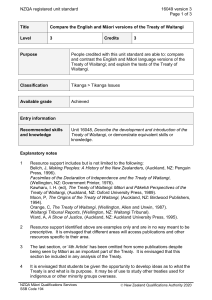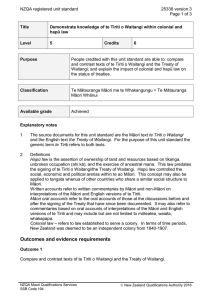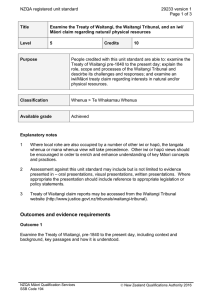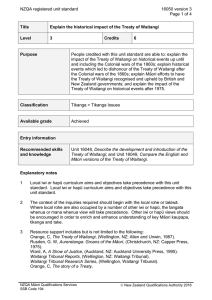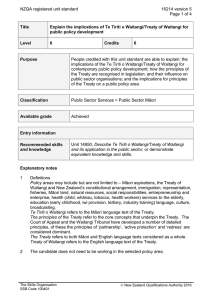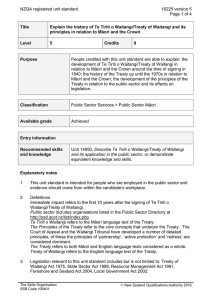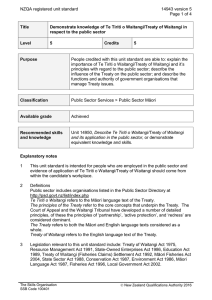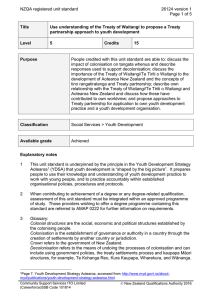NZQA registered unit standard 16069 version 4 Page 1 of 3
advertisement
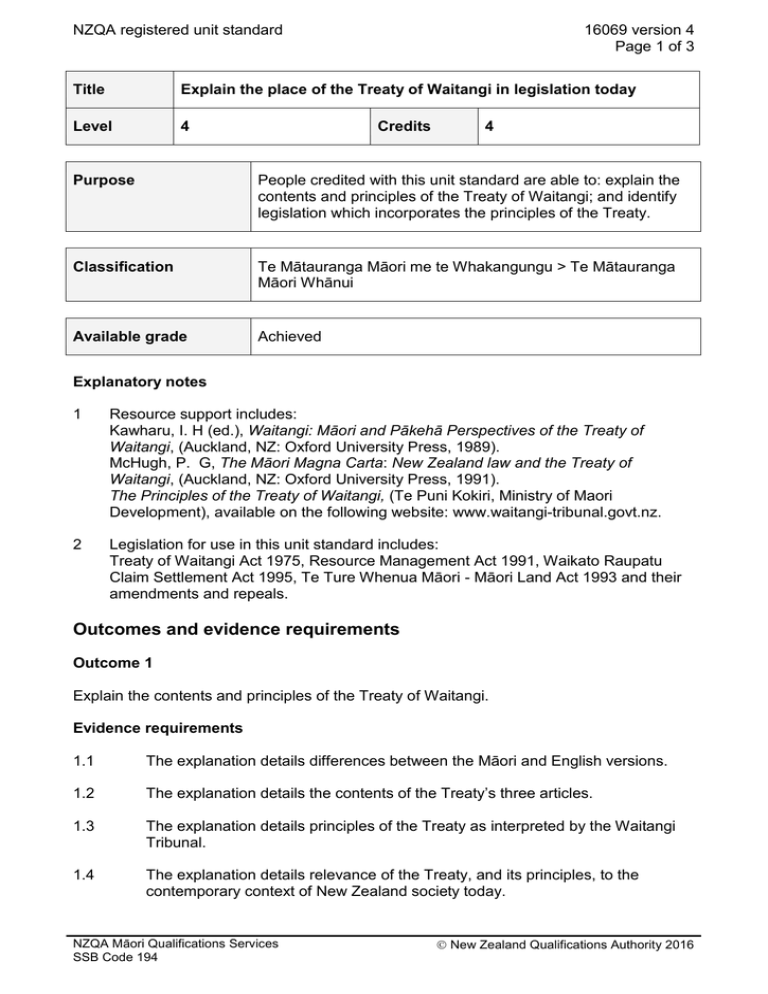
NZQA registered unit standard 16069 version 4 Page 1 of 3 Title Explain the place of the Treaty of Waitangi in legislation today Level 4 Credits 4 Purpose People credited with this unit standard are able to: explain the contents and principles of the Treaty of Waitangi; and identify legislation which incorporates the principles of the Treaty. Classification Te Mātauranga Māori me te Whakangungu > Te Mātauranga Māori Whānui Available grade Achieved Explanatory notes 1 Resource support includes: Kawharu, I. H (ed.), Waitangi: Māori and Pākehā Perspectives of the Treaty of Waitangi, (Auckland, NZ: Oxford University Press, 1989). McHugh, P. G, The Māori Magna Carta: New Zealand law and the Treaty of Waitangi, (Auckland, NZ: Oxford University Press, 1991). The Principles of the Treaty of Waitangi, (Te Puni Kokiri, Ministry of Maori Development), available on the following website: www.waitangi-tribunal.govt.nz. 2 Legislation for use in this unit standard includes: Treaty of Waitangi Act 1975, Resource Management Act 1991, Waikato Raupatu Claim Settlement Act 1995, Te Ture Whenua Māori - Māori Land Act 1993 and their amendments and repeals. Outcomes and evidence requirements Outcome 1 Explain the contents and principles of the Treaty of Waitangi. Evidence requirements 1.1 The explanation details differences between the Māori and English versions. 1.2 The explanation details the contents of the Treaty’s three articles. 1.3 The explanation details principles of the Treaty as interpreted by the Waitangi Tribunal. 1.4 The explanation details relevance of the Treaty, and its principles, to the contemporary context of New Zealand society today. NZQA Māori Qualifications Services SSB Code 194 New Zealand Qualifications Authority 2016 NZQA registered unit standard 16069 version 4 Page 2 of 3 Outcome 2 Identify legislation which incorporates the principles of the Treaty of Waitangi. Range evidence of two Acts required. Evidence requirements 2.1 The explanation details how the legislation incorporates the Treaty’s principles. 2.2 The explanation identifies the key sections in the legislation. Planned review date 31 December 2017 Status information and last date for assessment for superseded versions Process Version Date Last Date for Assessment Registration 1 29 June 1999 31 December 2015 Review 2 19 December 2003 31 December 2015 Rollover and Revision 3 12 December 2013 31 December 2016 Rollover and Revision 4 15 October 2015 N/A Consent and Moderation Requirements (CMR) reference 0166 This CMR can be accessed at http://www.nzqa.govt.nz/framework/search/index.do. Please note Providers must be granted consent to assess against standards (accredited) by NZQA, before they can report credits from assessment against unit standards or deliver courses of study leading to that assessment. Industry Training Organisations must be granted consent to assess against standards by NZQA before they can register credits from assessment against unit standards. Providers and Industry Training Organisations, which have been granted consent and which are assessing against unit standards must engage with the moderation system that applies to those standards. Requirements for consent to assess and an outline of the moderation system that applies to this standard are outlined in the CMR. The CMR also includes useful information about special requirements for organisations wishing to develop education and training programmes, such as minimum qualifications for tutors and assessors, and special resource requirements. NZQA Māori Qualifications Services SSB Code 194 New Zealand Qualifications Authority 2016 NZQA registered unit standard 16069 version 4 Page 3 of 3 Comments on this unit standard Please contact the NZQA Māori Qualifications Services mqs@nzqa.govt.nz if you wish to suggest changes to the content of this unit standard. NZQA Māori Qualifications Services SSB Code 194 New Zealand Qualifications Authority 2016



